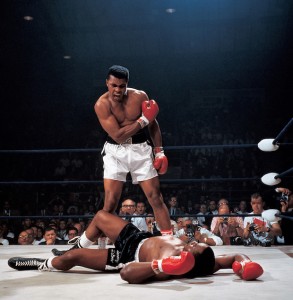 Unless you’re from Canada or a diehard hockey fan, the moniker “The Greatest” conjures up only one name on this side of the pond, especially. Whether you admire or detest him, all sports fans have to agree there’s a void in the sporting universe today. Muhammad Ali has died. His funeral was Friday in his hometown of Louisville, Ky.
Unless you’re from Canada or a diehard hockey fan, the moniker “The Greatest” conjures up only one name on this side of the pond, especially. Whether you admire or detest him, all sports fans have to agree there’s a void in the sporting universe today. Muhammad Ali has died. His funeral was Friday in his hometown of Louisville, Ky.
Ali, born Cassius Clay in 1942 and stricken with Parkinson’s disease in 1984 that reduced the once-proud three-time world heavyweight champion boxer to a mere shell of his former self, was the epitome of brash in his prime. He was literally the pioneer for those athletes many of us grow tired of hearing. But unlike those who talk a good line but are unable to translate those words into actions on the field, court, diamond or whatever playing surface they may choose, Ali could—with few exceptions—back up his words in the ring.
As a matter of fact, one of the jewels of wisdom I’ve carried with me throughout life was prompted by Ali. After watching one of those famous interviews between Ali and the venerable Howard Cosell, the late ABC sportscaster, I mentioned to my dad as a youngster how I didn’t really like Ali, that he was cocky.
Dad calmly said, “Son, it’s not cockiness if you can back it up.” I’m sure many have heard that in various forms but that stuck with me.
I was a bit too young to remember Ali, as Clay, winning the light-heavyweight gold medal at the 1960 Rome Summer Olympics and I only vaguely recall his 1964 victory over Sonny Liston (“the ugly bear,” as Ali—still Clay—called him) that earned him the title of heavyweight champion of the world the first time. It wasn’t until I got into junior high and high school and immersed myself into all sports that I can look back on and pretty much watch punch-by-punch of one of Ali’s fights in my mind. Ironically, it was one of his five losses.
It came after all the rigmarole of him changing his name upon joining the Nation of Islam, his draft fiasco, his having his title stripped and his three-year ban from boxing, and his almost ending up in jail for refusing induction into the Army. All those are subjects for discussion—as are his many philanthropic causes after his retirement from the ring in 1981, even one of his last real public appearances when he hit lit the cauldron before the 1996 Summer Olympics in Atlanta—for another time and another place.
I want to focus on Ali’s athletic prowess—and he had plenty of that. He could, indeed, back up his seemingly arrogant words in the squared circle. Despite that 15-round loss to the late Joe Frazier in March 1971 in New York—which to this day is a controversial decision to many only boxing followers, Ali came back and won two more world heavyweight titles and had many of the most memorable bouts in history.
He was king of the mountain at a time when the heavyweight division dominated boxing. Names like Ali, Frazier, Liston, Floyd Patterson, George Foreman (yes, before he was known primarily for his grills and infomercials he was a pretty good boxer), Ken Norton, Archie Moore and, to a lesser extent, Jerry Quarry, Ernie Terrell, Oscar Bonavena, Earnie Shavers, Joe Bugner, Jurgen Blin and even Alfredo Evangelista (any of those bring back memories?) would immediately cause fans to think of the sport of boxing.
Some of Ali’s fights even had names; the mere mention of a few will bring back fond recollections for any boxing enthusiast my age or older. I’ll list the five of the most well-known (in chronological order; fight descriptions copied from nydailynews.com):
• “The Phantom Punch” May 25, 1965 vs. Liston II
“In their rematch of the previous year’s upset by Clay (Ali was still known by than name), Liston was still favored but the bout, held in a tiny auditorium in Lewiston, Idaho, lasted about 90 seconds as the former champ crumpled with a quick right from his opponent. Was the fix in? That was the immediate belief because it made far more sense than the once-invincible Liston going down with such a quick punch.
“Rumors have flown for years but nothing has ever been proved and the majority of ringside observers seem to think the punch

Muhammad Ali after first round knockout of Sonny Liston during World Heavyweight Title fight at St. Dominic’s Arena in Lewiston, Maine on 5/25/1965.
was true. The fight is best known for the stunning photo of Ali standing over a fallen Liston, taunting him to get up. It was taken by Neil Leifer of Sports Illustrated and is considered to be the greatest sports photo in history. But not only was the shot not on the cover of that week’s SI, it didn’t appear in the issue at all.”
• What’s my name? Feb. 6, 1967 vs. Terrell
“In one of the few instances of Ali’s career, his opponent was the one who initiated the pre-fight banter. Prior to the fight, Terrell repeatedly called Ali ‘Clay,’ refusing to call him by his recently-adopted name, Muhammad Ali. Ali, who viewed his surname Clay as a ‘slave name,’ didn’t take to kindly to Terrell’s perceived disrespect. ‘I want to torture him,’ Ali told Sports Illustrated at the time. ‘I want to give him the Patterson humiliation and punish him. A clean knockout is too good for him.’
“Ali did just that. After dominating Terrell for the majority of the fight, Ali repeatedly taunted him in the later rounds, shouting at a bloodied and beaten Terrell, ‘What’s my name?’ and then throwing a punch. He’d then shout again, ‘What’s my name?’ followed by another punch, the Daily News reported. This would continue for the majority of the late rounds. For many in attendance, it appeared that Ali prolonged the fight—he would win nearly every round en route to a unanimous decision—just so he could inflict as much damage as humanly possible.”
• “The Fight of the Century” March 8, 1971 vs. Frazier I (the first Ali fight I remember)
“Leading up to the fight, both Ali (31-0, 25 knockouts) and Frazier (26-0, 23 KOs) were both undefeated and had legitimate claims to the title of Heavyweight Champion of the World. After defeating Liston in 1964, Ali had successfully defended his title up until he was stripped of his belt and banned from boxing in 1967 for refusing to be inducted into the armed forces. In Ali’s three-year absence, Frazier rose through the heavyweight ranks and at the time was recognized by boxing authorities as the World Champion.
“While Ali led the earlier rounds, he was unable to keep up with the face pace he had set and succumbed himself to multiple devastating blows from Frazier. Frazier was able to use his famous left hook, followed by a flurry of combinations, to visibly hurt Ali throughout the middle-to-later rounds. He eventually knocked Ali to the canvas twice, in rounds 11 and 15, and won the fight by unanimous decision. It was the first loss of Ali’s professional boxing career, but would set the stage for two more historic bouts between the two fighters.”
• “The Rumble in the Jungle” Oct. 29, 1974 vs. Foreman
“Despite coming off of an impressive win over Frazier, Ali was—once again—viewed as a heavy underdog in the weeks leading up to his bout with Foreman. Foreman (40-0, 37 KOs), 25, was considered stronger, younger and was generally more feared than Ali, after defeating both Frazier and Norton in two rounds each. Ali knew most people didn’t think he’d be able to win, saying as much during one of his pre-fight trash-talking rants, ‘And you, George Foreman! All of you chumps are gonna bow, when I whoop him. All of ya! I know you got him, I know you got him picked … But the man’s in trouble. I’m gonna show you how great I am!’
“And he did. Throughout the fight, Ali applied his famous ‘rope-a-dope’ tactic, positioning himself on the ropes and using his arms to cover himself and deflect Foreman’s punches. As a result, Foreman quickly fatigued, allowing Ali to respond with quick punches and combinations of his own. As Foreman grew tired, his punches lost its vicious power. Ali eventually knocked out an exhausted Foreman in the eighth round.”
• “The Thrilla in Manila” Oct. 1, 1975 vs. Frazier III
“The third bout between Ali and Frazier was the duo’s most gruesome. While Ali once again got off to an early start, Frazier eventually was able to gather himself and land multiple body punches while Ali attempted to implement his rope-a-dope strategy in the third round. Throughout the rest of the fight, the two would trade vicious combinations that left both of them bloody and beaten. After enduring a barrage of punches from Frazier in the sixth round, Ali said to him at the start of the seventh, ‘Old Joe Frazier, they told me you were washed up.’
“ ‘They lied, pretty boy,’ Frazier responded. The decisive turning point for Ali came in Round 14. Ali repeatedly threw a vicious cycle of combinations that staggered Frazier, leaving him half-blinded and completely helpless. ’Nothing but the gigantic heart and legs were holding up Joe Frazier,’ the Daily News boxing reporter wrote at the time. Frazier’s corner decided to call the fight after the round, giving Ali the win by technical knockout. Ali immediately fell to the canvas in sheer exhaustion, giving everything he had.”
Unlike today’s “champions,” Ali put his belt on the line nine times before his suspension and, after he reclaimed the crown following his suspension, five more times before losing it to Norton on March 31, 1973. After regaining the title on a rematch with Norton on Sept. 10 of that same year, Ali defended the belt 11 more times prior to losing it for the last time to Leon Sprinks on Feb. 17, 1978 (can anyone say the Mike Tyson vs. Buster Douglas before that fight was even thought about?). That’s 25 defenses, plus the three fights in which he won the heavyweight title.
There was none of this posturing for five years to get the money just right like Floyd Mayweather and Manny Pacquiao recently made fans suffer through—Ali fought all comers. And despite the five losses on his record at retirement, he was a pretty incredible 55-2 before dropping three of his last four fights.
He might not have been the best heavyweight boxer ever to step into the ring (boxing fans older than me would come up with at least Joe Louis or Rocky Marchiano for that), there’s no doubt Muhammad Ali was, is and will always be “The Greatest.”












